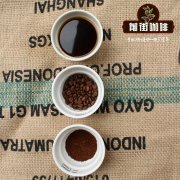What is the taste of Yunnan small-grain coffee | which Yunnan small-grain coffee tastes good and how does it taste?

Professional coffee knowledge exchange More coffee bean information Please pay attention to coffee workshop (Weixin Official Accounts cafe_style)
After 1886, a large number of British, French, American, Italian and German missionaries entered western Yunnan to preach. In 1892, French missionary Tian Deneng came to Zhukula Village, Binchuan, Dali to carry out missionary activities. The first coffee seed took root in Zhukula. Father Tian taught local villagers to grow coffee, drink coffee and sell coffee. From then on, local villagers began to have the habit of planting, grinding and drinking coffee by themselves, which continues to this day.
Zhu Kula's Yi language means winding mountain road. After Father Tian arrived at this place, his descendants translated Zhu Kula as "heaven on earth". At the end of the 19th century, Zhu Kula was almost isolated from the world due to inconvenient transportation. However, it is precisely because of its closure that Jukula is like a paradise, avoiding all kinds of disputes in history and allowing these coffee trees to survive.
The villagers of Zhukula have a special affection for coffee trees. Even in the period when coffee beans did not bring them any economic benefits, the villagers did not cut down a coffee tree. This is the oldest coffee forest in China, with a history of 100 years. As a result, coffee seeds quietly grow on Yunnan's land.
Coffee is a small evergreen tree of Rubiaceae, native to Africa, cultivated as a beverage plant mainly Arabica coffee and medium grain coffee. Coffea arabica cultivated in yunnan, china, is traditionally referred to as a mixed population of var. burgundy and var. tipica. Coffee tastes slightly bitter and refreshing, stimulating appetite function. Flavonoids are an important component of coffee. Coffee isoflavones have high medicinal value, can clear free radicals in human body, have biological activities and pharmacological effects such as cancer prevention, antioxidant, antibacterial, antiviral, etc., can delay aging, and have certain preventive and therapeutic effects on cancer and cardiovascular diseases.
After the 1950s, Yunnan coffee began to be industrialized. With the international and domestic situation and the intervention of multinational companies, Yunnan coffee industry experienced ebb and flow and made a tortuous progress.
Dehong Coffee Story
The west and south of Yunnan Province are located between 20° N and Tropic of Cancer. Most of the areas are 1000-2000 meters above sea level. The terrain is mainly mountainous and sloping, with large undulations, fertile soil, sufficient sunshine, abundant rainfall and large temperature difference between day and night. These unique natural conditions are very suitable for planting high-quality Arabica coffee, and Yunnan coffee has formed the characteristics of strong but not bitter, fragrant but not strong and slightly fruity.
Yunnan Arabica coffee is mostly planted in dry and hot valley areas with an altitude of about 1100 meters, so the sour taste is moderate, the flavor is rich and mellow. Many areas of Yunnan Province have unique environments suitable for the growth of Arabica coffee, and the Arabica coffee produced is of excellent quality. Planting areas are mainly distributed in Lincang, Baoshan, Simao, Xishuangbanna, Dehong, Nujiang and other prefectures. The Arabica coffee cultivated here is famous for its strong but not bitter, fragrant but not strong, well-proportioned grain facets, mellow fragrance and fruity flavor.
END
Important Notice :
前街咖啡 FrontStreet Coffee has moved to new addredd:
FrontStreet Coffee Address: 315,Donghua East Road,GuangZhou
Tel:020 38364473
- Prev

What are the common types and characteristics of boutique coffee | what are the representative varieties of fine coffee?
Professional coffee knowledge exchange more coffee bean information please follow the coffee workshop (Wechat official account cafe_style) 1, the ancient native species Typica: the oldest native variety in Ethiopia, all Arabica are derived from Tibica. The parietal leaves of Tiebika are bronzed and the beans are oval or thin in shape; the flavor is elegant, but the physique is weak, the disease resistance is poor, and it produces fruit.
- Next

Can cappuccino Yunnan small coffee be made? | how to make Yunnan small coffee latte?
Professional coffee knowledge exchange more coffee bean information please follow the coffee workshop (Wechat official account cafe_style) Yunnan as a major agricultural province in China, there are a lot of local specialties (www.yntcb.com) Yunnan small specialties on the land is countless. What I want to introduce to you today is coffee, a specialty product that has nothing to do with Yunnan at first glance. The Origin of Yunnan small Coffee
Related
- Beginners will see the "Coffee pull flower" guide!
- What is the difference between ice blog purified milk and ordinary milk coffee?
- Why is the Philippines the largest producer of crops in Liberia?
- For coffee extraction, should the fine powder be retained?
- How does extracted espresso fill pressed powder? How much strength does it take to press the powder?
- How to make jasmine cold extract coffee? Is the jasmine + latte good?
- Will this little toy really make the coffee taste better? How does Lily Drip affect coffee extraction?
- Will the action of slapping the filter cup also affect coffee extraction?
- What's the difference between powder-to-water ratio and powder-to-liquid ratio?
- What is the Ethiopian local species? What does it have to do with Heirloom native species?

